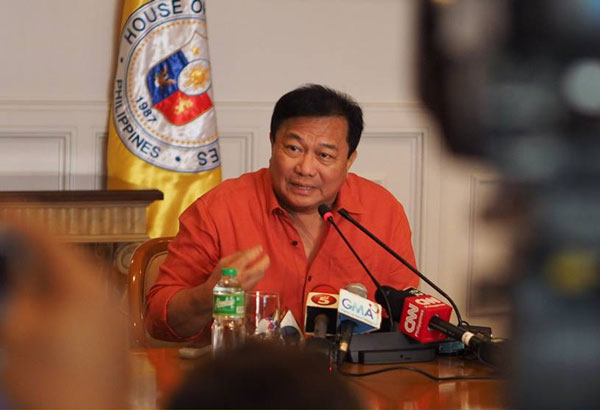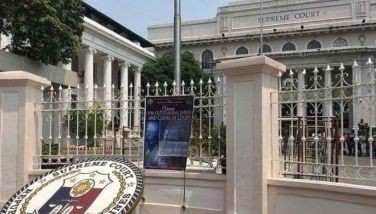Speaker warns SC: Don’t tell us what to do

Speaker Pantaleon Alvarez reminded the Supreme Court (SC) yesterday that being a co-equal independent body, the judiciary should not tell Congress what to do on certain issues like convening a joint session to tackle the declaration of martial law in Mindanao. Facebook/Speaker Pantaleon Alvarez, File
MANILA, Philippines - Speaker Pantaleon Alvarez reminded the Supreme Court (SC) yesterday that being a co-equal independent body, the judiciary should not tell Congress what to do on certain issues like convening a joint session to tackle the declaration of martial law in Mindanao.
“Let’s go back to our law books. How can the SC dictate on Congress what to do? It’s a co-equal body. Like if the SC issues a directive telling Congress, dictating Congress to convene and hold a joint session, pupunitin ko iyan (I will rip it up),” he warned.
Alvarez, a lawyer like President Duterte, said such an order by the high court would definitely result in a constitutional crisis that could be avoided, especially since the government never lied about the ongoing clashes in Marawi City.
“There will definitely be a constitutional crisis and it won’t be our fault,” Alvarez said in Filipino, noting that security forces are still fighting with members of the Islamic State-linked Maute group for more than two weeks now.
The Speaker said the group of Albay Rep. Edcel Lagman that claims to be the authentic opposition in the administration-dominated House of Representatives has “created a situation that could result in a clash between Congress and the SC.”
Alvarez said he could not understand why the petitioners were insisting on a joint session when both the Senate and the House have adopted their respective resolutions supporting the declaration of martial law in Mindanao.
“If we convene the joint session what would we talk about? We know what the decision will be,” Alvarez added.
Maybe Duterte’s detractors are pressing for a joint session in the hope of creating an opportunity to grandstand and promote their personal political interests, he said.
Like Alvarez, Solicitor General Jose Calida said that a constitutional crisis could happen if the SC orders Congress to convene in a joint session to discuss the declaration of martial law.
He said that both Congress and the SC are co-equal branches of government.
“It’s very clear in the language of the Constitution that Congress may convene in joint session if it will revoke or extend martial law, the sense of Congress is that they are supporting the martial law and the suspension of writ of habeas corpus,” Calida said.
“So why is there a need to convene that they have already voted on this issue and there is overwhelming consensus that they will not revoke it,” he added.
Calida’s statement came after he was asked to comment on Alvarez’s pronouncement that the House of Representatives would not heed the SC order on the convening of a joint session on the declaration of martial law.
Alvarez said he could not predict what would happen if a constitutional crisis ensues as a result of the petitions filed before the high court.
However, Alvarez said he is sure of one thing: the House of Representatives would not heed any order from the SC directing Congress to convene in a joint session.
No consolidation
The Supreme Court is not likely to consolidate the three petitions filed against President Duterte’s declaration of martial law in Mindanao, its spokesman said yesterday.
SC public information chief Theodore Te said he believes the first petition filed by a group of opposition lawmakers led by Lagman would be heard separately from the two other similar petitions filed by separate groups led by former senators Rene Saguisag and Wigberto Tañada.
He explained that only the Saguisag and Tañada petitions “would most likely be consolidated and will be dealt with separately” from the Lagman petition.
Te said the Saguisag and Tañada cases were both mandamus petitions, which “differ from the petition challenging the factual bases for martial law in Mindanao and will thus not be consolidated with the martial law petition (of Lagman).”
The SC official added that the two cases would not be covered by the oral arguments set next week.
The Lagman petition asked the SC to strike down the martial law proclamation for lack of factual basis while the second also sought issuance of a mandamus that would compel the Senate and House to convene jointly to review the declaration.
The other two petitions, on the other hand, asked the high court to issue a mandamus compelling the Senate and House to convene jointly to review Proclamation No. 216.
The SC has acted on the first petition in its session last Tuesday and ordered the executive branch to answer the plea of Lagman’s group.
It has set the case for oral arguments on June 13, 14 and 15 at 10 a.m.
The SC also required the respondents led by Executive Secretary Salvador Medialdea and Defense Secretary Delfin Lorenzana to submit their comments on the petition on or before Monday, June 12, Independence Day at noon.
It also set preliminary conference on the case on the same day at 2 p.m. and required parties to submit memoranda not later than June 19 after the oral arguments. – With Edu Punay
- Latest
- Trending






























